(最小路径覆盖) poj 2446
Description
Alice and Bob often play games on chessboard. One day, Alice draws a board with size M * N. She wants Bob to use a lot of cards with size 1 * 2 to cover the board. However, she thinks it too easy to bob, so she makes some holes on the board (as shown in the figure below).
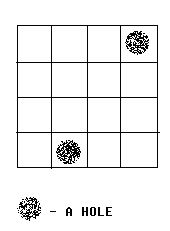
We call a grid, which doesn’t contain a hole, a normal grid. Bob has to follow the rules below:
1. Any normal grid should be covered with exactly one card.
2. One card should cover exactly 2 normal adjacent grids.
Some examples are given in the figures below:
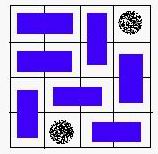
A VALID solution.
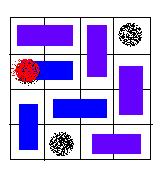
An invalid solution, because the hole of red color is covered with a card.
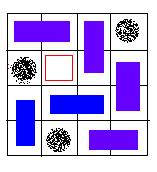
An invalid solution, because there exists a grid, which is not covered.
Your task is to help Bob to decide whether or not the chessboard can be covered according to the rules above.

We call a grid, which doesn’t contain a hole, a normal grid. Bob has to follow the rules below:
1. Any normal grid should be covered with exactly one card.
2. One card should cover exactly 2 normal adjacent grids.
Some examples are given in the figures below:

A VALID solution.

An invalid solution, because the hole of red color is covered with a card.

An invalid solution, because there exists a grid, which is not covered.
Your task is to help Bob to decide whether or not the chessboard can be covered according to the rules above.
Input
There are 3 integers in the first line: m, n, k (0 < m, n <= 32, 0 <= K < m * n), the number of rows, column and holes. In the next k lines, there is a pair of integers (x, y) in each line, which represents a hole in the y-th row, the x-th column.
Output
If the board can be covered, output "YES". Otherwise, output "NO".
Sample Input
4 3 2 2 1 3 3
Sample Output
YES
Hint
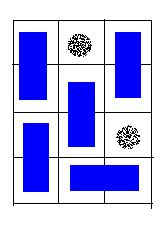
A possible solution for the sample input.
#include<iostream>
#include<cstdio>
#include<cstring>
#include<cmath>
#include<algorithm>
#include<cstdlib>
#include<string>
#include<queue>
#include<vector>
#include<stack>
using namespace std;
int mp[1230][1230],link[1230],mark[1230],g[35][35],ans,opt[35][35];
int n,m,k,temp;
bool dfs(int x)
{
for(int i=1;i<=temp;i++)
{
if(mark[i]==-1&&mp[x][i])
{
mark[i]=1;
if(link[i]==-1||dfs(link[i]))
{
link[i]=x;
return true;
}
}
}
return false;
}
int main()
{
int x,y;
while(scanf("%d%d%d",&n,&m,&k)!=EOF)
{
temp=0;
ans=0;
memset(link,-1,sizeof(link));
memset(g,0,sizeof(g));
memset(opt,0,sizeof(opt));
for(int i=1;i<=k;i++)
{
scanf("%d%d",&y,&x);
opt[x][y]=1;
}
for(int i=1;i<=n;i++)
{
for(int j=1;j<=m;j++)
{
if(!opt[i][j])
{
g[i][j]=++temp;
}
}
}
memset(mp,0,sizeof(mp));
for(int i=1;i<=n;i++)
{
for(int j=1;j<=m;j++)
{
if(g[i][j]!=0)
{
if(i>1&&g[i-1][j]!=0)
mp[g[i][j]][g[i-1][j]]=1;
if(i<n&&g[i+1][j]!=0)
mp[g[i][j]][g[i+1][j]]=1;
if(j>1&&g[i][j-1]!=0)
mp[g[i][j]][g[i][j-1]]=1;
if(j<m&&g[i][j+1]!=0)
mp[g[i][j]][g[i][j+1]]=1;
}
}
}
for(int i=1;i<=temp;i++)
{
memset(mark,-1,sizeof(mark));
if(dfs(i))
ans++;
}
if(ans==temp)
printf("YES\n");
else
printf("NO\n");
}
return 0;
}



